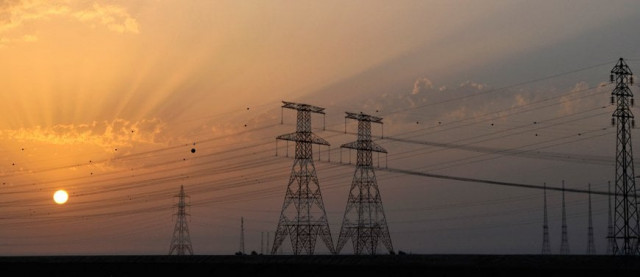NEPRA increases K-Electric’s tariff by Rs4.8 per unit
Company will receive additional Rs106 billion under quarterly tariff adjustments

PHOTO: REUTERS
In a statement issued on Tuesday, Nepra said the authority, based on the information, data and record provided by K-Electric, approved the quarterly adjustment claims of the power utility for the period Jul-Sept 2016 to Jan-Mar 2019. With the tariff revision, K-Electric will receive Rs106 billion from the consumers and the government, in the form of subsidy, for a total 11 quarterly adjustments.
The revised tariff was worked out at Rs17.69 per kilowatt-hour (kWh) and its impact would be felt in electricity bills for coming months. “The electricity price has been increased from Rs12.81 to Rs17.69 per unit, an increase of around Rs4.8 per unit,” a Nepra official said.
A major reason for the higher power tariff was the consumption of re-gasified liquefied natural gas (RLNG) by K-Electric in power production, which left an additional impact of Rs24 billion.
Other reason was the increase in gas prices from the reference price of Rs400 per million British thermal units (mmbtu) to Rs629 per unit.
Moreover, expensive furnace oil was also a factor as its rate went up from the reference price of Rs27,000 to around Rs70,000 per ton. Increase in operation and maintenance costs as well as capacity cost of independent power producers (IPPs) owing to indexation and exchange rate variation also led to the hike in electricity rates.
It is important to highlight that the government maintains a uniform tariff across the country, thus, the increase for consumers, if any, would be to the extent of maintaining uniformity across the country, and most of the increase would be settled at the government level, Nepra said in the statement.
Nepra dismissed as incorrect the notion that K-Electric consumers would pay an additional Rs4.87 per unit. “Tariff is uniform in entire Pakistan including for K-Electric consumers; Nepra gives different tariffs for distribution companies but the government makes them uniform across the country including for K-Electric consumers,” it clarified.
To make the tariff uniform, according to Nepra, the government gives subsidies to different categories of domestic, commercial, industrial and agricultural consumers. “Subsidies are provided across the country to all consumers including K-Electric consumers.”
Nepra pointed out that it took decision on a reconsideration request in the matter of K-Electric’s multi-year tariff (MYT) for seven years covering the period 2016-17 to 2022-23 on July 5, 2018. It approved average sale price of Rs12.8172 per kWh.
However, K-Electric challenged the decision in the Sindh High Court, which granted a stay order regarding notification for the determined tariff. Later, K-Electric withdrew its petition and the federal government notified the MYT on May 22, 2019.
According to the mechanism provided in the MYT determination, Nepra will review and revise the approved tariff on monthly, quarterly and annual basis in accordance with the prescribed adjustment mechanism. The impact of monthly variation in K-Electric’s fuel cost component as well as power purchase price to the extent of targeted transmission and distribution losses has to be adjusted on a quarterly basis.
In addition to that, the monthly variation in the variable operation and maintenance and fixed costs of the power producer, as allowed by the authority, is required to be adjusted on a quarterly basis. The hearing was held on August 21, 2019 in Karachi and Nepra Tower, Islamabad through video link.
Commenting on the development, a K-Electric spokesperson dismissed the claim that the tariff increase would be borne by the consumers.
He clarified that the government “maintains a uniform tariff across the whole country, thus, the increase for the consumers, if any, would be to the extent of maintaining uniformity across the country and would be notified by the Ministry of Energy”.
The spokesperson added that the tariff adjustments were mainly on account of increased furnace oil prices, gas prices and swapping of local gas with RLNG by Sui Southern Gas Company and were in line with the approved tariff adjustment process.
Published in The Express Tribune, January 1st, 2020.
Like Business on Facebook, follow @TribuneBiz on Twitter to stay informed and join in the conversation.


















COMMENTS
Comments are moderated and generally will be posted if they are on-topic and not abusive.
For more information, please see our Comments FAQ